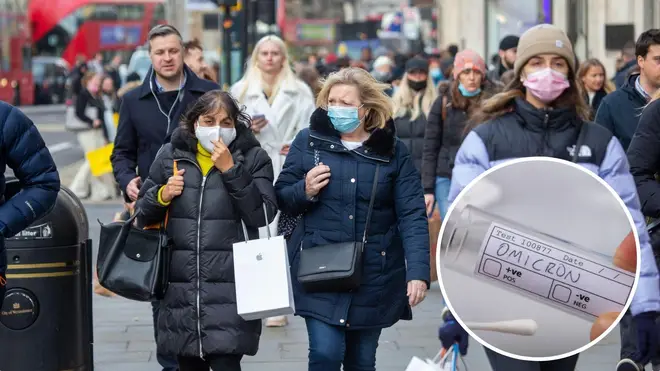
Henry Riley 4am - 7am
4 December 2021, 09:01 | Updated: 7 June 2023, 08:56

Another 26 cases of the Omicron coronavirus variant have been found in the UK, following targeted testing in locations "where positive cases were likely to be infectious".
The total number of confirmed cases in the UK is now 160, after another 75 were identified earlier today.
In Scotland 30 Omicron cases have been confirmed, one in Wales and none in Northern Ireland.
The UK Health Security Agency (UKHSA) said the increased case detection follows officials carrying out "targeted testing" at locations where the positive cases were likely to be infectious".
Dr Jenny Harries, the UKHSA chief executive, said this has led to more cases being detected, as we have seen in other countries.
She said teams are working nationally and locally at pace to identify and trace all close contacts of every Omicron case.
"It is critical that anyone with Covid-19 symptoms isolates and gets a PCR test immediately," she urged.
Read more: 'Community transmission' of Omicron variant in Scotland

Ben Kentish asks PM whether Omicron derails plans to return to normal
“We have started to see cases where there are no links to travel, suggesting that we have a small amount of community transmission.
"That’s why it’s so important that everybody, everywhere, takes simple steps to protect themselves from infection."
She called on people to wear face coverings in line with government guidance, let in fresh air when mixing indoors and wash your hands regularly.
Dr Harries added: “Vaccination is critical to help us bolster our defences against this new variant so please get your first, second, third or booster jab as soon as you are eligible to protect yourself, your families and your communities.”
Read more: 'Government not trying to tell public who they should kiss or where', minister says

The World Health Organization's chief scientist told the Reuters Next conference on Friday the Omicron variant could become dominant because it is highly transmissible, but that a different vaccine may not be needed.
Soumya Swaminathan also said it was too early to say whether Omicron is milder than other variants of the coronavirus that causes COVID-19 and cast doubt over its origin, saying it was far from certain it emerged in southern Africa.
She said Omicron "was highly transmissible" and cited data from South Africa showing the number of cases doubling daily.
"How worried should we be? We need to be prepared and cautious, not panic, because we're in a different situation to a year ago," Swaminathan said in an interview.
In the UK the booster vaccine programme is being rolled out to all adults following concerns over the Omicron variant.
NHS England has said the acceleration of delivering booster jabs will start no later than December 13, starting with the most vulnerable and going down in five-year age brackets.
It is not yet known whether the booster jabs will protect against the Omicron variant, as scientists are continuing to study the mutation and do not yet know enough.
However, experts behind a major new government-funded trial have suggested that existing Covid boosters - such as Moderna and Pfizer - could offer good protection against the new variant.
The research, undertaken by the University Hospital Southampton, also backs up the UK's decision to offer Pfizer or Moderna as a third shot, with mRNA jabs leading to the most significant rise in immunity levels.
Professor Saul Faust, trial lead and director of the NIHR Clinical Research Facility, said the vaccines worked well against existing variants, although Omicron was not tested in the study.

'Reasonable chance' of some vaccine-protection escape by Omicron
Despite this, experts think that T cell immunity - which was studied alongside antibodies in the research - could also play a significant role in fending off the variant.
T cells play a key role and work alongside antibodies in the immune system to target viruses.
Asked specifically about Omicron, Prof Faust said: "Our hope as scientists is that protection against hospitalisation and death will remain intact."
He said: "Even though we don't properly understand its relation to long-term immunity, the T cell data is showing us that it does seem to be broader against all the variant strains, which gives us hope that a variant strain of the virus might be able to be handled, certainly for hospitalisation and death if not prevention of infection, by the current vaccines."

Javid: If Omicron isn't harmful the rules could change
Boris Johnson has dismissed calls for further restrictions being necessary at this time, and has insisted the coronavirus rules are enough here in the UK.
He has said Christmas should go ahead "as normally as possible" this year despite concerns about Omicron.
Speaking during a by-election campaign visit to Oswestry in North Shropshire, the Prime Minister said that people did not need to cancel parties or nativity plays.
Asked what he had to say to bereaved families following claims Number 10 had held parties last year in breach of restrictions at the time, Mr Johnson said: "What I've said throughout, since this thing was brought up, was that's not true, we've followed the guidance throughout and continued to follow the guidance.
"And on the subject of Christmas parties, I've noticed there's been quite a lot of to-ing and fro-ing about it, people concerned that they need to cancel their Christmas parties. That's not right, we're not saying that and we're not saying that nativity plays have to be cancelled.
"I believe very strongly that kids should be in school and I also think that Christmas should go ahead as normally as possible. But the key point, the key point is that whatever the risk Omicron may pose, or may not pose, the booster is everywhere and always, vaccination is going to be your best protection, so everybody should get it."